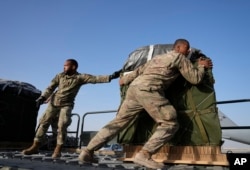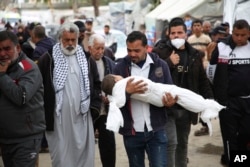Israeli Prime Minister Benjamin Netanyahu on Friday approved the resumption of ceasefire talks with Hamas, a day after the International Court of Justice in The Hague ordered Israel to provide emergency humanitarian aid to Palestinians facing famine in the Gaza Strip.
Netanyahu’s announcement marks another attempt to reach a deal with the armed group that would suspend Israel’s military offensive in Gaza in exchange for the release of Israeli hostages.
As the war approaches six months, the United States, Qatar and Egypt have been working to mediate another ceasefire and the release of hostages since the first in November.
Netanyahu, who faces domestic pressure over his failure to bring home all the hostages taken by militants on October 7, said he had spoken to Israel’s chief negotiator and authorized an Israeli delegation to Qatar and Egypt ceasefire negotiations. sky.
Hamas has previously proposed a gradual ceasefire process during which all remaining hostages would be released in exchange for an end to the war, a full Israeli withdrawal from Gaza, the opening of borders to aid and reconstruction and the release of hundreds of Palestinians. Palestinian prisoners, including senior militants serving life sentences.
Netanyahu called Hamas’s terms delusional and vowed that Israel would resume its offensive after the hostages were released and continue fighting until the armed group was eliminated.
Hamas is believed to be holding about 100 hostages, as well as the remains of about 30 people who were killed in Hamas terror attacks in Israel on Oct. 7 that killed about 1,160 people, according to an AFP tally.
Israel’s retaliatory campaign to destroy Hamas has so far killed at least 32,623 people, mostly women and children, and injured more than 70,000, according to the Health Ministry in Hamas-controlled Gaza.
Much of the enclave has been reduced to rubble, and most of Gaza’s population has taken refuge in the southern Gaza border city of Rafah.
food insecurity and famine
The ICJ ordered Israel to “take all necessary and effective measures to ensure the immediate” provision of “urgently needed basic services and humanitarian assistance.”
Philippe Lazzarini, the head of the United Nations agency for Palestinian refugees, warned in a post on social media platform .
According to the United Nations and international aid groups, Gaza’s 2.3 million people face severe food insecurity due to Israeli military restrictions, ongoing hostilities and a breakdown in public order that have hampered the delivery of aid.
Famine is likely in parts of the northern Gaza Strip, a senior U.S. State Department official said on Friday, adding that shortages in food convoys were hampering the delivery of more aid to the Palestinian enclave under siege by Israel.
“While we can confidently say that famine, a significant risk, does not exist in the south and center, in the north it is both a risk and is likely to exist at least in some areas,” the official told Reuters. “anonymous.
The United Nations has warned that Gaza faces famine and complained of “enormous obstacles” to accessing and distributing aid across the enclave.
The war is still going on
The binding ruling by the International Court of Justice leaves few means of enforcement, while the Israeli military said on Friday that the territory’s largest hospital in Shifa would continue operations for a 12th day.
Palestinian health officials said two Israeli attacks on the Al-Shejaia suburb in eastern Gaza City killed 17 people, while an Israeli airstrike on a house in the Al-Maghazi refugee camp in the central Gaza Strip killed eight people.
The Israeli military said its forces continued operations in and around Gaza City’s Shifa complex “while mitigating harm to civilians, patients, medical teams and medical equipment.” The Israel Defense Forces said they killed about 200 militants and recovered weapons and military infrastructure during Operation Al-Shifa over the past day.
Israeli forces “carried out targeted attacks on terrorist infrastructure” near Amal Hospital in Khan Younis, killing dozens of people in air-supported battles, the army said on Thursday.
“We have split in two and are preparing to enter Rafah,” Netanyahu said on Thursday.
The armed wing of Hamas said its militants targeted Israeli forces near Khan Younis Nasser Hospital, one of two hospitals in the city that had been blockaded by Israeli soldiers for several days.
In the southernmost part of the Gaza Strip, Israel continues to bombard Rafah, the last Palestinian refuge, where more than half of Gaza’s 2.3 million people have taken refuge. On Thursday night, an airstrike on a house killed 12 Palestinians.
Information for this report was provided in part by The Associated Press, AFP and Reuters.
Follow us on Google news ,Twitter , and Join Whatsapp Group of thelocalreport.in

